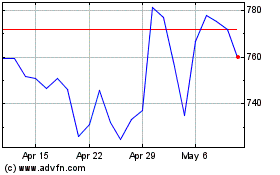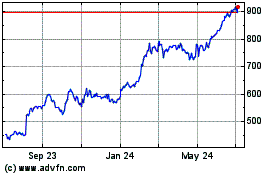New Diabetes Drug Shows Sharply Reduced Risk of Heart-Related Death
September 17 2015 - 6:50PM
Dow Jones News
By Ron Winslow
A new diabetes drug marketed by Eli Lilly & Co. and
Boehringer Ingelheim GmbH sharply reduced the risk of heart-related
death in a large clinical trial, researchers said, marking the
first time a diabetes medicine has shown such a benefit against
cardiovascular disease.
In the 7,020-patient study, those taking Jardiance had a 14%
lower risk of suffering a heart attack or stroke or dying of
cardiovascular disease than those taking a placebo. The risk of
death from heart-related causes alone was reduced by 38%,
researchers said, while death from any cause was reduced by
32%.
Silvio Inzucchi, professor of medicine at Yale University School
of Medicine and director of the Yale Diabetes Center, said the
reduction in heart-related death was "impressive." Studies looking
at the cardiovascular effect of other diabetes drugs have been
"neutral," Dr. Inzucchi said. "It's been very depressing," he said.
"This is the first time we've had a positive result."
Dr. Inzucchi was the senior author of the study, which was
published online Thursday by the New England Journal of Medicine.
Dr. Inzucchi also presented the findings at the annual meeting of
the European Association for the Study of Diabetes in
Stockholm.
Lilly and closely held Boehringer Ingelheim had previously
announced that the trial had shown a survival benefit, but the
details weren't disclosed until they were presented at the
meeting.
The magnitude of the benefit surprised not only researchers but
also investors, who drove Lilly shares up 6.47% to $89.91. Leerink
Partners called the results "exceedingly positive" and predicted
changes in treatment guidelines that could increase use of
Jardiance.
The drug, which was approved by the U.S. Food and Drug
Administration in August 2014, is a member of a class of drugs
called SGLT-2 inhibitors. Other SGLT-2s including Invokana from
Johnson and Johnson and Farxiga from AstraZeneca plc could also get
a boost from the findings, Leerink said.
Nearly 30 million Americans have diabetes, the vast majority the
type 2 version, which is often associated with being overweight or
obese. While treatment focuses on lowering blood sugar,
cardiovascular disease is the most common cause of death among
diabetics, yet lowering glucose hasn't been shown to affect heart
risk.
Dr. Inzucchi said blood sugar reduction in the study was modest
and not likely the reason for the benefit. "It's something about
the drug itself, " he said. Interestingly, he noted, the drug
didn't reduce risk of a heart attack or stroke. He speculated that
the main benefit was likely related to effects that made it easier
for the heart to beat. Patients in the study had a 35% reduction in
risk of hospitalization for heart failure.
Write to Ron Winslow at ron.winslow@wsj.com
Subscribe to WSJ: http://online.wsj.com?mod=djnwires
(END) Dow Jones Newswires
September 17, 2015 18:35 ET (22:35 GMT)
Copyright (c) 2015 Dow Jones & Company, Inc.
Eli Lilly (NYSE:LLY)
Historical Stock Chart
From Mar 2024 to Apr 2024

Eli Lilly (NYSE:LLY)
Historical Stock Chart
From Apr 2023 to Apr 2024
